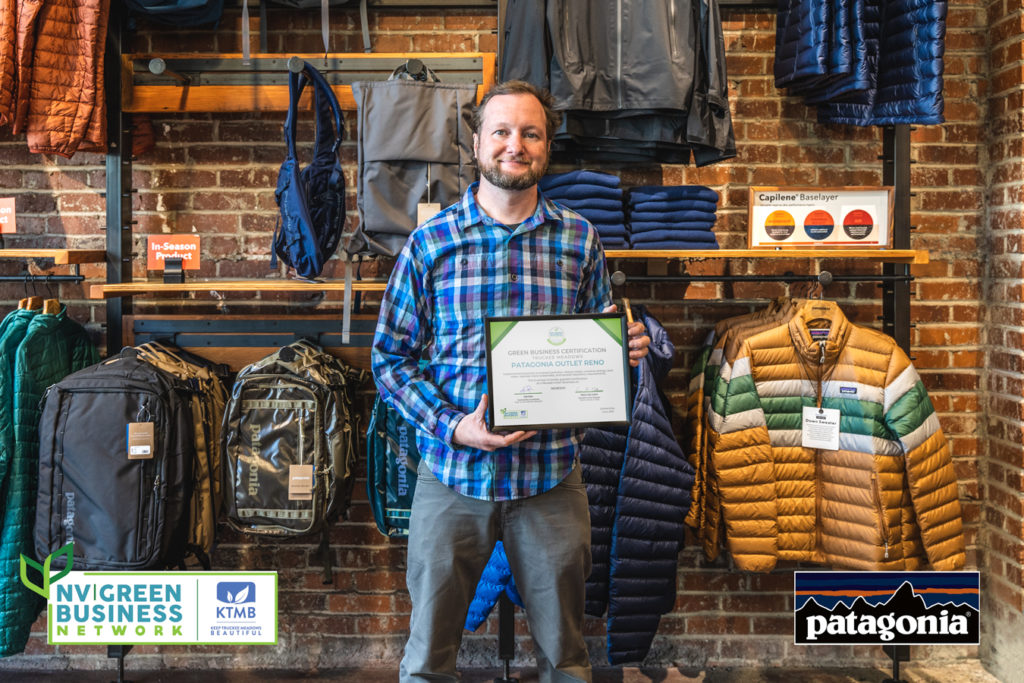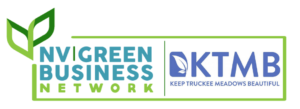Patagonia Reno Outlet: Bringing Sustainability to the Clothing Industry


Aaron Altshuler, Store Manager, receiving his Green Business certificate.
The Patagonia Outlet has been in Reno since 1996, when the global distribution center was built. They currently employ twenty individuals. Patagonia is one of the most well-known global retailers for outdoor clothing, and the largest clothing repair center in North America is located here in Reno!
Patagonia’s Mission Statement is “We’re in business to save our home planet”, so sustainability is built into everything they do. The clothing industry is not the most sustainable, but Patagonia is trying to build their products in the most sustainable way possible, and have been since they were founded in 1973. Through this certification they hope to get word out into the community about their sustainable practices.
The founder of Patagonia, Yvon Chouinard, also founded One Percent for the Planet. As a global company, Patagonia is extremely involved in conservation and sustainability efforts. From the Worn Wear Program to their recently initiated t-shirt recycling program, Patagonia is making strides to reduce their footprint and create sustainable products and a greener planet.
The Worn Wear Program is the largest environmental initiative that takes place at the Reno Outlet. Through this program, customers can have their clothing repaired free of charge. This program also includes a buy back option where customers can sell their no longer needed items back to Patagonia and receive a gift card in return. Those items are then professionally laundered, and resold at discounted prices, keeping unwanted clothing out of the landfill.
They also have a recycling program in which they accept Patagonia clothes that are at the end of their lives and turn them into new items. Patagonia recently started a t-shirt recycling program. There is a collection bin at the front of the Reno Outlet where they collect any old Patagonia t-shirts. If they are made of polyester, nylon or any blend, the shirts are recycled. If the shirt is made of cotton, it can be made into two new Patagonia t-shirts.

As an innovator-tier business, they went above and beyond the standard green business requirements; one way they did this was by implementing their “Drive Less” Program. This program incentives employees to reduce their single occupant motorized transportation by paying $2 per trip for walking, biking, carpooling or using public transportation. This has resulted in 30-50 percent of their employees opting for an alternative mode of transportation.
They also took a deep dive into quantifying and reducing consumption at the Outlet. They are opting for reusable and recyclable options such as recyclable receipt paper and dry erase boards as opposed to printing paper advertisements and information.
One challenge the Patagonia Reno Outlet ran into when starting their zero-waste initiative was their in-store waste generation. They found that they were generating significantly more waste than originally expected; from the plastic-poly bags the clothing items are shipped in, to fluorescent light bulbs. One way they chose to combat their waste generation was by making a conscious choice to not have any trash or recycling bins on their sales floor in hopes of reducing the opportunity for waste in the store. On average they recycle 40,000 pounds of stretch plastic and poly bags every five to seven months with a local Nevada business that turns the bags into decking materials.
Another challenge they ran into when working to become more environmentally friendly and energy efficient was the lighting within the store. Their store space contains many different types of light fixtures, some fluorescent, some LED, and some wired directly into the building. Because they have so many different types of fixtures, as lights burn out, they are taking the opportunity to incrementally upgrade to greener, more efficient options.
Within the clothing industry, production and manufacturing is typically not the most sustainable. Historically, many companies use non-organic cotton which is processed with numerous chemicals and uses large quantities of water. Specifically within outdoor clothing brands, the use of durable water repellent finish (DWR) can cause chemical leaching into the soil and groundwater. Patagonia is working to combat the lack of sustainability within their industry by working to create sustainable waterproof clothing treatments and making their products out of organic cotton.
Aaron Altshuler, the Store Manager, believes that the recognition of the Green Business Certification has helped them reach a broader audience and increase clientele. The certification has helped get the word out into the local community that the Patagonia Reno Outlet is a green business.
When asked to share some advice to other businesses looking to go green, Aaron responded: “take the time and do it, it’s not that hard.” He recommends that if there is an employee that is particularly interested in sustainability and green business, it is a great opportunity for them to gain experience and take the lead on this certification. “It’s definitely worth it and easier than you think!” notes Aaron.
To learn more about the Patagonia Reno Outlet visit patagonia.com/reno.

Nevada Green Business Network (NVGBN) is a coalition of organizations that came together to offer a statewide green business certification program.